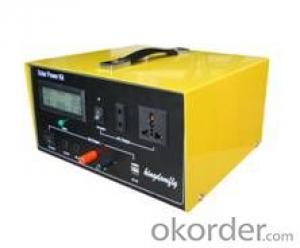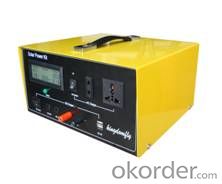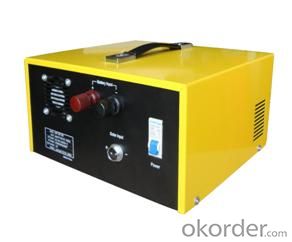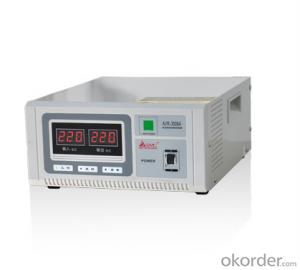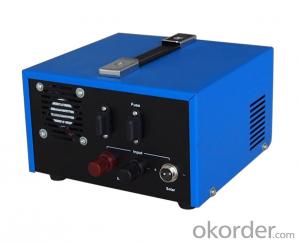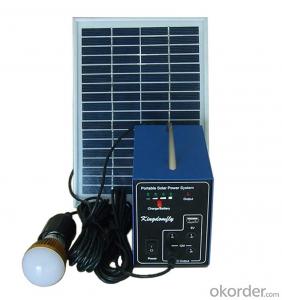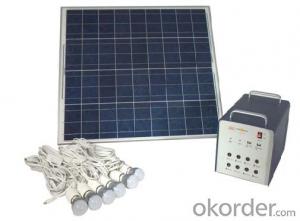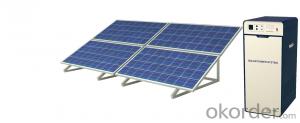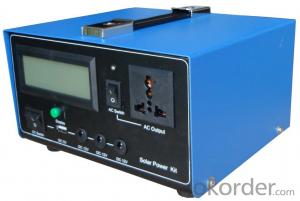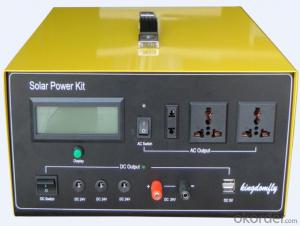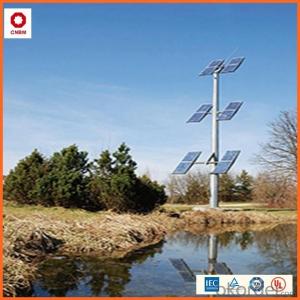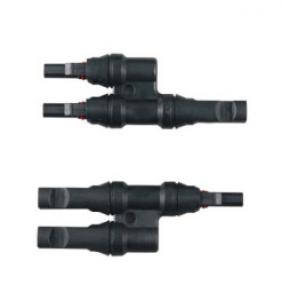Solar Energy Systems of Brevard Inc - SPK-500 Solar Power System for Home
- Loading Port:
- China main port
- Payment Terms:
- TT OR LC
- Min Order Qty:
- 3 pc
- Supply Capability:
- 10000 pc/month
OKorder Service Pledge
OKorder Financial Service
You Might Also Like
Main Information
KDF SPK_500 This product is high performance,family used portable solar power system,which can receive energy and store it in battery outside connected to SPK by solar energy on sunny day,and supplies electric power for varies appliances such as electric fan,lighting lamps, television, portable computer etc.It can supply power for both DC and AC electric application .It’s very helpful and useful for home electric supply.
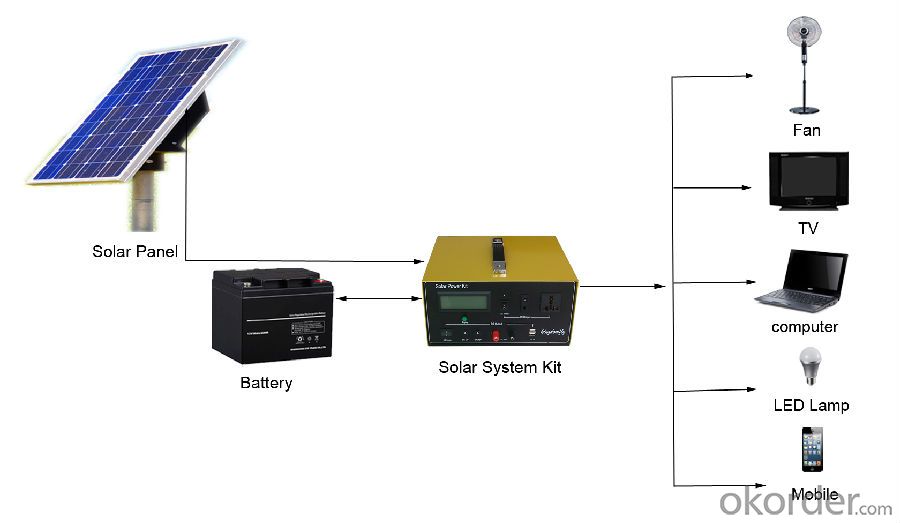
Features:
◆ Battery puts outside connected to the SPK for user to choose battery in recommended range, and easily to exchange battery.
◆ Both DC and AC output
◆ Solar Feedback Circuit Protection
◆ Output Short-circuit Protection
◆ Solar「+」「-」anti-access protection
◆ Output「+」「-」anti-access protection
◆ Over Charged Protection
◆ Over Discharged Protection
◆ Over Load Protection
◆ Over-Temperature Protection
Technical parameters
Specification | Value/Material | |
Item No. KDF | SPK_500 | |
Solar Recommended | Specification | Poly silicon |
Working Voltage/Power | 18V50W~300W | |
Battery Recommended | Rated Voltage/Capacity | 12V40AH~200AH |
Cycle Number | 80% Deep Cycle Number:500 70% Cycle Number:800 | |
Working Temperature | Short Period(one Month):-20~50℃ Long Period(Six Months):-10~45℃ | |
Charging Controller | Operating Voltage | 12V |
Input Voltage | 17.3V~21V | |
Input current | MAX:10A | |
Power Consumption | MAX: 5mA | |
Low Voltage Disconnect(LVD) | 10.8V | |
Low Voltage Reconnect(LVR) | 12.3V | |
High Voltage Discharge( HVC) | 14.6V | |
High Voltage Recharge(HVR) | 13.8V | |
Temperature Protection | 60℃ | |
DC Output | DC output & Application | USB 5V2A |
DC output & Application | DC 12V1*3A | |
AC Output | Output Wave | modified sine wave |
Input Voltage | 11V~15V | |
Output Voltage | 110V±10% | |
Output Frequency | 60Hz±2Hz/50Hz±2Hz | |
Rated Output Power | 300W | |
Maximum VA | 600VA | |
Maximum Efficiency | 88% | |
Temperature | 0-40℃ | |
Over Temperature | 60℃~70℃ | |
Low Voltage Alarm | 11V | |
Low Voltage Shut off | 10.5V | |
High Voltage Shut off | 16V | |
Package | Set size | 331*338*217mm |
Set N·W | 3.8kg | |
Set N·W | 4.6kg | |
LCD_Display
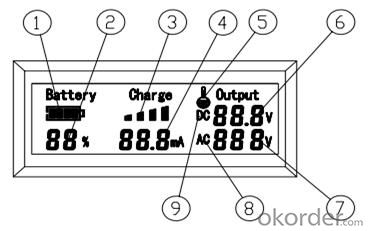
No. | Name | Function |
1 | Battery Icon | To show the Volume of the Battery |
2 | Date of % | To show the percent of the Battery |
3 | Charging Icon | To show the charging condition |
4 | Current | To show the value of charge current |
5 | Temperature Icon | Temperature Alarm |
6 | Date of Voltage | To Show the Value of DC output voltage |
7 | Date of Voltage | To Show the Value of AC output voltage |
8 | AC Icon | AC output |
9 | DC Icon | DC output |
- Q: What is the role of solar energy systems in reducing heat island effect?
- Solar energy systems play a crucial role in reducing the heat island effect by capturing and utilizing the sun's energy for electricity generation. By relying on renewable energy sources like solar power, we can reduce the reliance on fossil fuels and decrease the heat generated from traditional energy production methods. Additionally, solar panels help to absorb and convert sunlight into electricity, which reduces the amount of heat that is reflected back into the environment. This not only helps to mitigate the urban heat island effect but also contributes to overall climate change mitigation efforts.
- Q: What is the ideal direction for solar panels to face?
- The ideal direction for solar panels to face is south (in the northern hemisphere) or north (in the southern hemisphere). This orientation allows the panels to capture maximum sunlight throughout the day, optimizing their energy generation.
- Q: What is the role of solar energy systems in reducing energy poverty?
- Solar energy systems play a crucial role in reducing energy poverty by providing affordable and sustainable electricity to communities that lack access to the traditional power grid. These systems harness the abundant sunlight to generate clean and renewable energy, which can power homes, schools, hospitals, and other essential facilities. By bypassing the need for expensive infrastructure and fuel imports, solar energy systems offer a cost-effective solution for meeting basic energy needs in remote and underprivileged areas. They not only improve the quality of life and economic opportunities for those affected by energy poverty but also contribute to mitigating climate change and enhancing energy security.
- Q: Can solar energy systems be used for powering electric vehicle rental services?
- Yes, solar energy systems can be used to power electric vehicle rental services. Solar panels can generate electricity which can be stored in batteries or directly used to charge electric vehicles. This renewable energy source can provide a sustainable and cost-effective way to power electric vehicles in rental services, reducing carbon emissions and promoting clean transportation solutions.
- Q: Can a solar energy system be installed in an off-grid location?
- Yes, a solar energy system can be installed in an off-grid location. Off-grid locations that do not have access to a traditional power grid can benefit from solar energy systems as they can generate and store electricity independently, using the sun's energy. These systems usually include solar panels, batteries for energy storage, and inverters to convert the stored energy into usable electricity. This allows off-grid locations to have a reliable and sustainable source of power.
- Q: Are there any fire safety concerns associated with solar energy systems?
- Yes, there are fire safety concerns associated with solar energy systems. While solar panels themselves do not generally cause fires, issues can arise with the electrical components of the system, such as faulty wiring, improper installation, or inadequate maintenance. Additionally, firefighters may face challenges in fighting fires involving solar panels due to the risk of electrocution and the inability to easily disconnect the system from the electrical grid. Proper installation, regular inspections, and adherence to safety guidelines can help mitigate these concerns.
- Q: Can a solar energy system be used for charging electric vehicles?
- Yes, a solar energy system can definitely be used for charging electric vehicles. Solar panels, which capture sunlight and convert it into electricity, can be installed on rooftops, carports, or open spaces to generate clean and renewable energy. This energy can then be used to charge electric vehicles, eliminating the need for traditional fossil fuel-based charging methods. Solar-powered charging stations are becoming increasingly popular and are being installed in various locations, such as parking lots, highways, and residential areas, to support the growing demand for electric vehicles. By utilizing solar energy for charging electric vehicles, we can significantly reduce greenhouse gas emissions and dependence on non-renewable energy sources, thus contributing to a more sustainable and environmentally friendly transportation system.
- Q: How do solar energy systems impact the energy consumption of buildings?
- Buildings' energy consumption is significantly impacted by solar energy systems. These systems harness the sun's power to generate clean and renewable electricity, which can offset the need for grid-based energy. One of the main ways solar energy systems affect energy consumption is by decreasing reliance on non-renewable sources like fossil fuels. Coal, oil, and natural gas, which are traditional energy sources, contribute to greenhouse gas emissions and global warming. Conversely, solar power produces electricity without emitting any harmful substances, making it an environmentally friendly alternative. Additionally, solar systems help reduce a building's overall energy demand. By generating electricity on-site, buildings can decrease their dependence on the electrical grid. This not only lessens the strain on the grid but also lowers the risk of power outages during periods of peak demand or natural disasters. Moreover, solar energy systems can lead to financial savings for building owners. When solar panels generate electricity, the building consumes less power from the grid, resulting in reduced utility bills. In some cases, surplus energy generated by the solar system can be sent back to the grid, allowing building owners to earn credits or even receive payments from utility companies through net metering programs. Furthermore, solar energy systems offer long-term benefits for buildings. Solar panels have a lifespan of approximately 25 to 30 years, and their maintenance costs are relatively low compared to other energy systems. This implies that once the initial investment is recovered, the building can enjoy years of clean and affordable energy. To conclude, solar energy systems positively impact buildings' energy consumption by reducing reliance on non-renewable sources, lowering overall energy demand, providing financial savings, and offering long-term sustainability.
- Q: Can solar energy systems be used for powering airports or transportation hubs?
- Certainly, airports or transportation hubs can utilize solar energy systems for power. Solar energy represents a renewable and sustainable power source that can be obtained by installing solar panels. These panels absorb sunlight and convert it into electricity, which can then be utilized to power various operations within airports or transportation hubs. By implementing solar energy systems, a constant and dependable power source can be provided for running lighting systems, air conditioning, heating, ventilation systems, and other electrical equipment. This reduces reliance on conventional energy sources and diminishes the carbon footprint of these facilities. Additionally, airports and transportation hubs often possess expansive roof areas, parking lots, and open spaces, making them ideal locations for solar panel installation. These vast areas can generate a significant amount of solar power, making these facilities excellent candidates for solar energy systems. In fact, several airports and transportation hubs worldwide have already adopted solar energy systems. For instance, Cochin International Airport in India is the world's first airport to be fully powered by solar energy, producing more energy than it consumes. Similarly, Denver International Airport in the United States has installed a large array of solar panels to meet its power requirements. Employing solar energy systems in airports and transportation hubs not only cuts operating costs but also supports environmental sustainability. It aids in mitigating greenhouse gas emissions, reducing dependence on fossil fuels, and contributing to the global shift towards clean and renewable energy sources. In summary, solar energy systems present a feasible and efficient solution for powering airports and transportation hubs, offering various benefits like cost savings, environmental conservation, and energy self-sufficiency.
- Q: How do solar energy systems impact energy conservation efforts?
- Solar energy systems have a significant impact on energy conservation efforts, as they harness the power of the sun to generate electricity without depleting natural resources or emitting harmful greenhouse gases. By utilizing solar power, we reduce our reliance on fossil fuels, which helps to minimize air pollution and combat climate change. Solar energy systems also encourage energy conservation by promoting efficiency and raising awareness about sustainable practices.
Send your message to us
Solar Energy Systems of Brevard Inc - SPK-500 Solar Power System for Home
- Loading Port:
- China main port
- Payment Terms:
- TT OR LC
- Min Order Qty:
- 3 pc
- Supply Capability:
- 10000 pc/month
OKorder Service Pledge
OKorder Financial Service
Similar products
Hot products
Hot Searches
Related keywords
